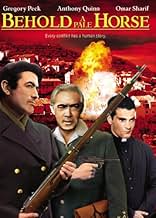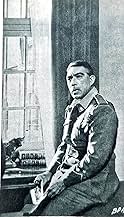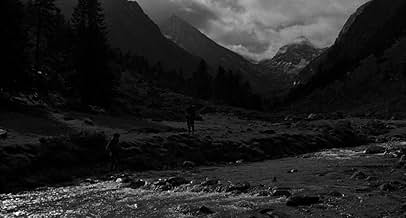VALUTAZIONE IMDb
6,7/10
2441
LA TUA VALUTAZIONE
Il famoso bandito spagnolo Artiguez torna nel suo villaggio natale in Spagna dopo 20 anni trascorsi in esilio in Francia, ma il poliziotto spagnolo Vinolas gli sta tendendo una trappola.Il famoso bandito spagnolo Artiguez torna nel suo villaggio natale in Spagna dopo 20 anni trascorsi in esilio in Francia, ma il poliziotto spagnolo Vinolas gli sta tendendo una trappola.Il famoso bandito spagnolo Artiguez torna nel suo villaggio natale in Spagna dopo 20 anni trascorsi in esilio in Francia, ma il poliziotto spagnolo Vinolas gli sta tendendo una trappola.
- Regia
- Sceneggiatura
- Star
Marietto
- Paco Dages
- (as Marietto Angeletti)
Perrette Pradier
- Maria, Hussy
- (as Perette Pradier)
Recensioni in evidenza
8wilp
I saw this film years ago and it made a deep impression (even if my interest in the Spanish War does bias me in its favour); it's on my short list of works to locate and see again. Its treatment of generations and of legacies is as relevant as ever, now that the number of people living who witnessed that upheaval is shrinking fast. The film will move boys (who can identify with one of the main characters) and will not deprave them with violence, the little violence (if I remember correctly) being more suggestive than explicit. A psychological film with some intensely aesthetic moments.
When the Spanish War was finished, winners devoted to go after anybody who reflected the red light of the communism or any other color they dislike. On the other hand, few guerilla fighter continued his actions against the winners. But their strength was lower every time. One of this guerrilla was Valentin González "el campesino", which figure is portrayed in this film in a free form (not in an historical form).
Twenty years after the Civil war conclusion, the Spanish police has a good option to capture one of these ex-combatants, who was in exile in France. The description of the methods and day-to-day life of the Spanish police could be the reason which explains that the Spanish Government forbade any more Columbia's film in Spain.
You need no knowledge about the twenty Century Spain's history to understand the film, although you can enjoy more it if you know something. In fact, the film put in a specific political situation the psychological confrontation between two men. It could be a good exercise to understand the motives which impulse his actions.
Twenty years after the Civil war conclusion, the Spanish police has a good option to capture one of these ex-combatants, who was in exile in France. The description of the methods and day-to-day life of the Spanish police could be the reason which explains that the Spanish Government forbade any more Columbia's film in Spain.
You need no knowledge about the twenty Century Spain's history to understand the film, although you can enjoy more it if you know something. In fact, the film put in a specific political situation the psychological confrontation between two men. It could be a good exercise to understand the motives which impulse his actions.
In 1939 like John Wayne's Ethan Edwards in The Searchers, Gregory Peck does not believe in surrenders. When all the others give up their weapons and go home, Peck conspicuously keeps his and keeps up the good fight. Of course twenty years later, Peck's become nothing more than a common bandit with the barest trappings of the revolutionary ardor he once had for the Republican cause in the Spanish Civil War.
His rival, his Pat Garrett to Peck being Billy the Kid, is the local captain of the Guardia Civil in Anthony Quinn. Peck's constant raids into his border area from France are a source of embarrassment to him and block his chances for advancement. At one time Quinn was a hardened Falangist, but now he's just a policeman.
Twenty years as made a lot of changes in both men. Quinn a devote Catholic who probably joined the fascist forces because of the anti-clerical attitudes of the Republican government now observes the form of religion, but he's got a mistress on the side. When he goes to pray it's not for anything profound, just please let him get Peck so he can advance.
Peck is as anti-clerical as he was during the Spanish Civil War in the late Thirties, but now is really into it a lot for violence's sake. He also knows his cause is long lost, but needs the excuse for what he's now doing. He also gets quite a surprise in finding a priest like Omar Sharif going to warn him about an informer in his crew. Catholics do come in all shapes and sizes.
Although Peck is somewhat miscast as a Spaniard, still he does a good job as does Quinn and Sharif. The strength of Behold a Pale Horse is that it presents both Peck and Quinn as flesh and blood people, neither of them all good or all evil from your point of view.
Behold a Pale Horse was made in 1964 and eleven years later Francisco Franco in whose service Quinn was in died after being dictator of Spain for 36 years. When I visited Spain in 2001 the thing that struck me was how there was very little evidence of Franco's reign. Spain has now settled quite nicely into a constitutional monarchy with a functioning parliament. And the Catholic church which rode as high in Spain as it did during Philip II is rapidly losing influence.
Kind of makes you wonder just what Peck and Quinn were fighting about.
His rival, his Pat Garrett to Peck being Billy the Kid, is the local captain of the Guardia Civil in Anthony Quinn. Peck's constant raids into his border area from France are a source of embarrassment to him and block his chances for advancement. At one time Quinn was a hardened Falangist, but now he's just a policeman.
Twenty years as made a lot of changes in both men. Quinn a devote Catholic who probably joined the fascist forces because of the anti-clerical attitudes of the Republican government now observes the form of religion, but he's got a mistress on the side. When he goes to pray it's not for anything profound, just please let him get Peck so he can advance.
Peck is as anti-clerical as he was during the Spanish Civil War in the late Thirties, but now is really into it a lot for violence's sake. He also knows his cause is long lost, but needs the excuse for what he's now doing. He also gets quite a surprise in finding a priest like Omar Sharif going to warn him about an informer in his crew. Catholics do come in all shapes and sizes.
Although Peck is somewhat miscast as a Spaniard, still he does a good job as does Quinn and Sharif. The strength of Behold a Pale Horse is that it presents both Peck and Quinn as flesh and blood people, neither of them all good or all evil from your point of view.
Behold a Pale Horse was made in 1964 and eleven years later Francisco Franco in whose service Quinn was in died after being dictator of Spain for 36 years. When I visited Spain in 2001 the thing that struck me was how there was very little evidence of Franco's reign. Spain has now settled quite nicely into a constitutional monarchy with a functioning parliament. And the Catholic church which rode as high in Spain as it did during Philip II is rapidly losing influence.
Kind of makes you wonder just what Peck and Quinn were fighting about.
I get surprise when see that only a few people see this film because I think that it is one of the best zinnemann film.The story which is about alone man that is far from of best years of his life and right now is desolate and subsist in very hard condition(spiritual)is so nice.Peck,Quinn and Sharif all are in their best. Scene that vinolas(Quinn)pray in church is unforgettable.
There have not been many English-language movies made about the Spanish Civil War, and those that have been made (with the exception of Land and Freedom) tend to shy away from both politics and action, often slow-moving, contemplative affairs. In that vein Behold a Pale Horse, based on a novel by Hungarian screenwriter Emeric Pressburger, is a meditation on loyalty, trust and faith, not in religion but in religious institutions and individuals. The Spanish Civil War, or rather its aftermath, are the backdrop for these themes. But despite this ruminating premise the picture just about manages to save itself from terminal dullness.
A lot of this has to do with director Fred Zinnemann. Zinnemann was not exactly a dynamic director but he had a certain way of drawing us into a story and holding our interest. During the opening credits his camera tracks along a line of nameless faces, encouraging us to look over every line and notice every blink, introducing a quietly human picture. And yet he is also placing people within their context, showing young Paco dwarfed amid the houses of Pau, mirroring the mountains from which he has descended, or panning down from the figure of Christ to a reverent Anthony Quinn (shades here of Zinnemann's other Christian-themed pictures A Nun's Story and A Man for All Seasons). Above all Zinnemann is a master of tension without over-manipulation. Events seem to unfold in real-time, with a sprinkling of point-of-view shots to draw us into the unfolding action.
It is interesting to see Gregory Peck and Anthony Quinn playing the hero and villain. Both men are possessed of dark hair and sharp, stony features. Both have a stern bearing and charismatic presence. One can imagine them playing brothers; a good twin and a bad twin perhaps. They are both very good here, but the best performance I feel belongs to Omar Shariff, grappling with some kind of a conscience, refusing to make the meek priest into a stereotype. Italian character actor Paolo Stoppa, familiar from a lot of European co-productions, is very good too. Finally, watch out for a brief but typically mesmerising bit part by Rosalie Crutchley as Quinn's wife.
A strong cast and thoughtful direction are enough to keep this picture moving. Also of note is the Maurice Jarre score. This was by now an era in which you didn't have to have a blaring orchestral score (and thankfully those irritating free jazz scores of the late 50s were going out of style). Behold a Pale Horse features sparse and staccato Spanish guitar, fitting for both the location and the nervous and somewhat melancholic story. This is far from being a war movie, but it is a picture of great solemnity, atmosphere and touching humanity.
A lot of this has to do with director Fred Zinnemann. Zinnemann was not exactly a dynamic director but he had a certain way of drawing us into a story and holding our interest. During the opening credits his camera tracks along a line of nameless faces, encouraging us to look over every line and notice every blink, introducing a quietly human picture. And yet he is also placing people within their context, showing young Paco dwarfed amid the houses of Pau, mirroring the mountains from which he has descended, or panning down from the figure of Christ to a reverent Anthony Quinn (shades here of Zinnemann's other Christian-themed pictures A Nun's Story and A Man for All Seasons). Above all Zinnemann is a master of tension without over-manipulation. Events seem to unfold in real-time, with a sprinkling of point-of-view shots to draw us into the unfolding action.
It is interesting to see Gregory Peck and Anthony Quinn playing the hero and villain. Both men are possessed of dark hair and sharp, stony features. Both have a stern bearing and charismatic presence. One can imagine them playing brothers; a good twin and a bad twin perhaps. They are both very good here, but the best performance I feel belongs to Omar Shariff, grappling with some kind of a conscience, refusing to make the meek priest into a stereotype. Italian character actor Paolo Stoppa, familiar from a lot of European co-productions, is very good too. Finally, watch out for a brief but typically mesmerising bit part by Rosalie Crutchley as Quinn's wife.
A strong cast and thoughtful direction are enough to keep this picture moving. Also of note is the Maurice Jarre score. This was by now an era in which you didn't have to have a blaring orchestral score (and thankfully those irritating free jazz scores of the late 50s were going out of style). Behold a Pale Horse features sparse and staccato Spanish guitar, fitting for both the location and the nervous and somewhat melancholic story. This is far from being a war movie, but it is a picture of great solemnity, atmosphere and touching humanity.
Lo sapevi?
- QuizThe movie was banned in Spain, which was still ruled by Generalisimo Francisco Franco, the fascist victor of the Spanish Civil War.
- BlooperIn the first 5 minutes of the movie it is supposed to be 1939 and the Loyalist (Republican) soldiers are crossing into exile on the French border. As they cross over they are turning in their guns and the first one to turn in his gun turns in a Soviet PPSh-41 sub-machine gun. The PPSh-41 was not developed until 1941.
- Curiosità sui creditiOpening credits - the first card shown contains the passage from Revelations 6:8, which contains the phrase "Behold a Pale Horse", the title of the film.
- ConnessioniFeatured in Hollywood contra Franco (2008)
I più visti
Accedi per valutare e creare un elenco di titoli salvati per ottenere consigli personalizzati
- How long is Behold a Pale Horse?Powered by Alexa
Dettagli
Botteghino
- Budget
- 3.900.000 USD (previsto)
- Tempo di esecuzione2 ore 1 minuto
- Colore
- Mix di suoni
- Proporzioni
- 1.85 : 1
Contribuisci a questa pagina
Suggerisci una modifica o aggiungi i contenuti mancanti

Divario superiore
By what name was ...e venne il giorno della vendetta (1964) officially released in India in English?
Rispondi



































